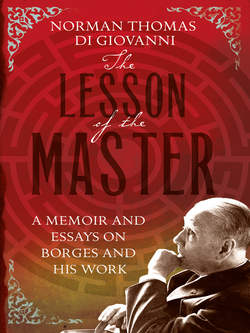Читать книгу The Lesson of the Master - Литагент HarperCollins USD, Norman Thomas di Giovanni - Страница 6
Foreword to the First Edition
ОглавлениеThe twenty-fourth of August 1999 marked the centenary of the birth of Jorge Luis Borges, the Argentine’s best known and one of its greatest literary figures.
Some thirty years ago, while he was delivering a series of public addresses at Harvard University, our paths crossed, we began working together on translations of his work into English, and we became friends. Looking back now, I find that the impact of Borges on the course of my life seems to have been only inches short of a miracle. Within a few brief months of our meeting, publishers began to compete for his stories and poems and essays in the new versions of them that we were making. On the eve of his return to Buenos Aires, in April 1968, he invited me to join him in his country, and seven months later I was there, plunged into the thick of his life and into the life of Argentina.
All that is a story yet to be told. Back then, while these events were unfolding, everything was hectic and crowded, and I was offered no leisure for reflection. Yet never once was I unaware of how rich and marvellous was life alongside Borges. So rich and indelible were those days of our close association, in fact, that even now, over a decade after his death, he still inhabits most of my working hours and occasionally, at night, even my dreams.
The little memoir and the essays collected here are in the nature of a homage and a contribution to the celebration of Borges’s life and work. The book is no attempt to deliver the final word on him or on any aspect of what he wrote. Offering simple guidance and a commonsensical approach to reading him, the pieces are more tentative and modest. In most ways, these pages are the close-up view, the record, of someone who worked on a daily basis with Borges at a distinctive and critical period of his life, when he overcame various adversities and experienced a rich late flowering.
The Lesson of the Master has had a singular genesis. At the outset of our association, when Borges and I were working on an English edition of his selected poems, he described me in a letter to his Buenos Aires publisher, the late Carlos Frías, as the volume’s ‘onlie begetter’. It was a term that both men, teachers of English literature, savoured.
Originally, I wanted to publish the memoir that opens the present volume as a tailpiece to Borges’s ‘Autobiographical Essay’, a 20,000-word text that he and I composed together in English, in 1970. The Borges Estate, however, did not look kindly on the idea. No explanation, no reasons, were given for their decision, but somehow my work of 1988 was not deemed worthy of appearing alongside my work with Borges of 1970. An Argentine editor came along, however, and said that he would undertake to publish the two essays separately.
Working with Borges, one had come to appreciate the fact that less was more, but my thirty-odd-page essay, I thought to myself, was about to become the slimmest book on record. Marcial Souto, my mentor in these matters and himself a minimalist in literary creation, was also apprehensive. (It was he who had brought the original project to the Argentine editor’s attention.) Souto suggested that I couple with the memoir some other related piece or pieces of mine. I sent him a further essay, twenty pages long, and he approved. For a month or two after, I was haunted by the melancholy notion that – when all I wanted was to bring out a volume worthy of the master – I was about to become holder of the even less distinguished record of producing the second slimmest book in publishing history. This would not do. Ransacking my papers, I began to turn up the material that eventually made its way into the present pages. It is in this roundabout way, then, that the Borges Estate is the ‘onlie begetter’ of these essays. To the Estate and to Mr Souto, my thanks.
Norman Thomas di Giovanni
October 1999
